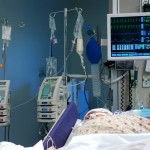
Ventilator-associated pneumonia (VAP) is a life-threatening condition in critically ill patients receiving mechanical ventilation. Incidence rates vary between 9% and 45% and it carries a significant mortality risk. The oropharynx and upper gastrointestinal tract are the main reservoirs for the associated pathogens. The aim of this review was to evaluate the effects of oral care using toothbrushes in mechanically ventilated critically ill adults as a strategy to reduce VAP.
The reviewers used a robust methodological approach with searches of Embase, Medline, and the Cochrane Controlled Trials Register and Database of Systematic Reviews for randomised controlled trials in mechanically ventilated critically ill adults. The Cochrane tool was used to assess risk of bias with overall quality of evidence being assessed using the GRADE approach. A random effects meta-analysis was conducted.
- Six trials involving 1,408 patients were included; 5 compared toothbrushing to usual oral care and one of which compared electric with manual toothbrushing.
- In 4 trials, there was a trend toward lower VAP rates (risk ratio, 0.77; 95% confidence interval, 0.50-1.21; p = 0.26). This trend was also observed in one trial reporting fewer cases VAP per 1,000 ventilator days (20.68 vs. 25.89; p = 0.53) in patients receiving toothbrushing vs. no toothbrushing.
- The only trial with low risk of bias suggested that toothbrushing significantly reduced VAP (risk ratio, 0.26; 95% confidence interval, 0.10-0.67; p = 0.006).
- Use of chlorhexidine antisepsis seems to attenuate the effect of toothbrushing on ventilator-associated pneumonia (p for the interaction = 0.02).
- One trial comparing electric vs. manual toothbrushing showed no difference in ventilator-associated pneumonia rates (risk ratio, 0.96; 95% confidence interval, 0.47-1.96; p = 0.91).
- Toothbrushing did not impact on length of ICU stay, or ICU or hospital mortality.
The authors concluded
In intubated, mechanically ventilated critically ill patients, toothbrushing did not significantly reduce the risk of ventilator-associated pneumonia overall. Toothbrushing has no effect on mortality or length of stay. Electric and manual toothbrushing seem to have similar effects. More research is needed on this aspect of oral care to evaluate its potential to decrease ventilator-associated pneumonia.
Comment
This well conducted review did show a trend toward lower rates of VAP with toothbrushing which was not significant. The authors note that while there are low grade nursing recommendations to support toothbrushing it is not mentioned in existing VAP prevention guidelines. We have previously looked at studies on this topic ( see Links) and currently there is a Cochrane review underway which is looking at, ‘Oral hygiene care for critically ill patients to prevent ventilator associated pneumonia.’
Links
Alhazzani W, Smith O, Muscedere J, Medd J, Cook D. Toothbrushing for critically ill mechanically ventilated patients: a systematic review and meta-analysis of randomized trials evaluating ventilator-associated pneumonia. Crit Care Med. 2013 Feb;41(2):646-55.
Shi Z, Xie H, Wang P, Wu Y, Chen E, Ng L, Worthington HV, Singer M, Needleman I. Oral hygiene care for critically ill patients to prevent ventilator associated pneumonia (Protocol). Cochrane Database of Systematic Reviews 2010, Issue 2. Art. No.: CD008367. DOI: 10.1002/14651858.CD008367.
Dental Elf Nov 28th 2011 – Mouth care and ventilator-associated pneumonia

[…] Dental Elf May 20th 2013 – Review finds that toothbrushing has only a small effect on ventilat… […]